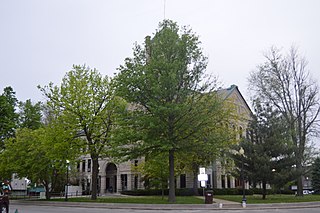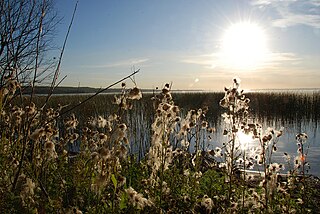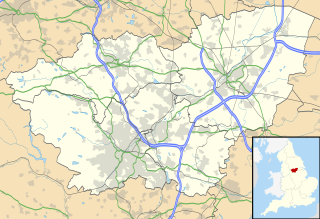Coal tar is a thick dark liquid which is a by-product of the production of coke and coal gas from coal. It has both medical and industrial uses. Medicinally it is a topical medication applied to skin to treat psoriasis and seborrheic dermatitis (dandruff). It may be used in combination with ultraviolet light therapy. Industrially it is a railroad tie preservative and used in the surfacing of roads. Coal Tar was listed as a known human carcinogen in the first Report on Carcinogens from the U.S. Federal Government.

Taylorville is a city in and the county seat of Christian County, Illinois, United States. The population was 11,246 at the 2010 census, making it the county's largest city.

Domtar Corporation is a Canadian company that manufactures and markets wood fiber-based paper and pulp product. The company operates pulp and paper mills in Windsor, Quebec, Dryden, Ontario, Kamloops, British Columbia, Ashdown, Arkansas, Hawesville, Kentucky, Plymouth, North Carolina, and Marlboro County, South Carolina. While the company operated independently for several decades with listing on the Toronto and New York stock exchanges, the company was acquired by Paper Excellence in November 2021 and has since operated as a subsidiary.

Asarco LLC is a mining, smelting, and refining company based in Tucson, Arizona, which mines and processes primarily copper. The company has been a subsidiary of Grupo México since 1999.

The Resource Conservation and Recovery Act (RCRA), enacted in 1976, is the principal federal law in the United States governing the disposal of solid waste and hazardous waste.
Coal gasification is the process of producing syngas—a mixture consisting primarily of carbon monoxide (CO), hydrogen (H2), carbon dioxide (CO2), natural gas (CH4), and water vapour (H2O)—from coal and water, air and/or oxygen.

The Sydney Tar Ponds were a hazardous waste site on Cape Breton Island in Nova Scotia, Canada.

Wabamun Lake is one of the most heavily used lakes in Alberta, Canada. It lies 65 kilometres (40 mi) west of Edmonton, Alberta. It is 19.2 kilometres (11.9 mi) long and 6.6 kilometres (4.1 mi) narrow, covers 82 square kilometres (32 sq mi) and is 11 metres (36 ft) deep at its deepest, with somewhat clear water.

Hexavalent chromium is chromium in any chemical compound that contains the element in the +6 oxidation state. Virtually all chromium ore is processed via hexavalent chromium, specifically the salt sodium dichromate. Hexavalent chromium is key to all materials made from chromium. Approximately 136,000 tonnes of hexavalent chromium were produced in 1985.

A gasworks or gas house is an industrial plant for the production of flammable gas. Many of these have been made redundant in the developed world by the use of natural gas, though they are still used for storage space.
An Asset Retirement Obligation (ARO) is a legal obligation associated with the retirement of a tangible long-lived asset in which the timing or method of settlement may be conditional on a future event, the occurrence of which may not be within the control of the entity burdened by the obligation. In the United States, ARO accounting is specified by Statement of Financial Accounting Standards 143, which is Topic 410-20 in the Accounting Standards Codification published by the Financial Accounting Standards Board. Entities covered by International Financial Reporting Standards (IFRS) apply a standard called IAS 37 to AROs, where the AROs are called "provisions". ARO accounting is particularly significant for remediation work needed to restore a property, such as decontaminating a nuclear power plant site, removing underground fuel storage tanks, cleanup around an oil well, or removal of improvements to a site. It does not apply to unplanned cleanup costs, such as costs incurred as a result of an accident.
Indiana Harbor Belt Railroad Co. v. American Cyanamid Co., 916 F.2d 1174 is a decision of the United States Court of Appeals for the Seventh Circuit authored by Judge Richard Posner. The case has subsequently become a staple of first year Torts courses taught in American law schools, where the case is used to address the question of when it is better to use negligence liability or strict liability.

Derwenthaugh Coke Works was a coking plant on the River Derwent near Swalwell. The works were built in 1928 on the site of the Crowley's Iron Works, which had at one time been the largest iron works in Europe. The coke works was closed and demolished in the late 1980s, and replaced by Derwenthaugh Park.

The Bawtry gasworks contamination involved land at Bawtry, South Yorkshire, England containing hazardous byproducts from the manufacture of coal gas. Remediation of the land was at public expense through the Environment Agency (EA), who then sought to recover the costs from National Grid Gas (NGG), then known as Transco, declaring it the "appropriate person" under Part IIA of the Environmental Protection Act 1990 and therefore liable on the basis that one or more of its statutory predecessors caused the contamination. NGG sought a judicial review in the High Court of Justice where Mr Justice Forbes ruled that they were liable for the costs of the decontamination. The ruling was considered a crucial issue by NGG as, if they were deemed liable in this particular instance, then they could be found liable in a substantial number, possibly thousands, of other cases involving former gasworks.
The Ashland/Northern States Power Lakefront Superfund site is a contaminated region of the Wisconsin shoreline of Lake Superior that is being studied for remediation by Northern States Power Wisconsin (NSPW), as well as the Environmental Protection Agency (EPA), the Wisconsin Department of Natural Resources (WDNR). This site has held a manufactured gas plant from 1845 to 1947, as well as lumber manufacturing and treatment mills for four decades at the start of the 20th century, railcar loading facilities, and a municipal landfill. Additionally, a wastewater treatment plant is located on the premises, but is not in operation. Contamination of the site is currently believed to have been caused by all the parties mentioned above, or former owners of the property whose companies are no longer in business. The area is listed as a Superfund site by the EPA under the Comprehensive Environmental Response, Compensation, and Liability Act (CERCLA). Releases of hazardous substances occurred onshore and migrated into sediment in Chequamagon Bay on Lake Superior.

The Elk River chemical spill occurred on January 9, 2014 when crude 4-Methylcyclohexanemethanol (MCHM) was released from a Freedom Industries facility into the Elk River, a tributary of the Kanawha River, in Charleston in the U.S. state of West Virginia.
Water in Arkansas is an important issue encompassing the conservation, protection, management, distribution and use of the water resource in the state. Arkansas contains a mixture of groundwater and surface water, with a variety of state and federal agencies responsible for the regulation of the water resource. In accordance with agency rules, state, and federal law, the state's water treatment facilities utilize engineering, chemistry, science and technology to treat raw water from the environment to potable water standards and distribute it through water mains to homes, farms, business and industrial customers. Following use, wastewater is collected in collection and conveyance systems, decentralized sewer systems or septic tanks and treated in accordance with regulations at publicly owned treatment works (POTWs) before being discharged to the environment.
The White Chemical Corporation Superfund site is 4.4 acres of contaminated industrial land in Newark, New Jersey, about a half mile away from Newark Airport. The Newark site operated from 1983 to July 1990, selling small amounts of chemicals. Some of the chemicals sold there were Trichloroethylene and 1-2-Dichloroethane. These chemicals were being improperly stored and leaked into the soil and groundwater. The EPA placed the property on the National Priorities List (NPL) in 1991, declaring it a Superfund site.

In February 2014, an Eden, North Carolina facility owned by Duke Energy spilled 39,000 tons of coal ash into the Dan River. The company later pled guilty to criminal negligence in their handling of coal ash at Eden and elsewhere and paid extremely minimal fines of over $5 million, compared to its $24 billion revenue in 2014. The U.S. Environmental Protection Agency (EPA) has since been responsible for overseeing cleanup of the waste. EPA and Duke Energy signed an administrative order for the site cleanup.

Bill Clutter is an American private investigator, wrongful conviction advocate, and author. He is the co-founder of the Illinois Innocence Project and founder of the national wrongful conviction organization Investigating Innocence. His work on the Donaldson v. Central Illinois Public Service Company case led him to write the book Coal Tar: How Corrupt Politics and Corporate Greed Are Killing America's Children, which is the story of an epidemic of neuroblastoma in Taylorville, IL caused by exposure to coal tar.













